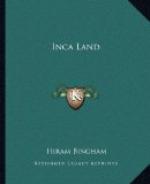Another version is given by Montesinos in his Anales. It is more like Titu Cusi’s.
[5] A Spanish derivative from the Quichua mucha, “a kiss.” Muchani means “to adore, to reverence, to kiss the hands.”
[6] Uiticos is probably derived from Uiticuni, meaning “to withdraw to a distance.”
[7] Described in “Across South America.”
[8] On the 1915 Expedition Mr. Heller captured twelve new species of mammals, but, as Mr. Oldfield Thomas says: “Of all the novelties, by far the most interesting is the new Marsupial .... Members of the family were previously known from Colombia and Ecuador.” Mr. Heller’s discovery greatly extends the recent range of the kangaroo family.
[9] Mr. Safford says in his article on the “Identity of Cohoba” (Journal of the Washington Academy of Sciences, Sept. 19, 1916): “The most remarkable fact connected with Piptadenia peregrina, or ‘tree-tobacco’ is that ... the source of its intoxicating properties still remains unknown.” One of the bifurcated tubes."in the first stages of manufacture,” was found at Machu Picchu.
[10] See the illustrations in Chapters XVII and XVIII.
[11] Since the historical Uilcapampa is not geographically identical with the modern Vilcabamba, the name applied to this river and the old Spanish town at its source, I shall distinguish between the two by using the correct, official spelling for the river and town, viz., Vilcabamba; and the phonetic spelling, Uilcapampa, for the place referred to in the contemporary histories of the Inca Manco.
[12] In those days the term “Andes” appears to have been very limited in scope, and was applied only to the high range north of Cuzco where lived the tribe called Antis. Their name was given to the range. Its culminating point was Mt. Salcantay.
[13] Titu Cusi was an illegitimate son of Manco. His mother was not of royal blood and may have been a native of the warm valleys.



